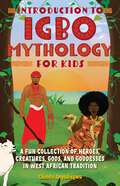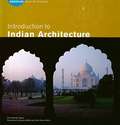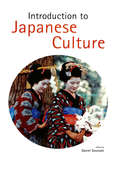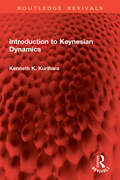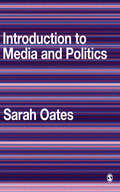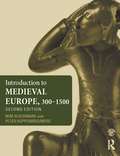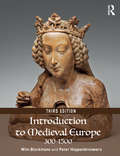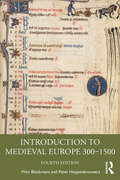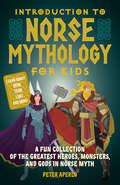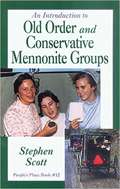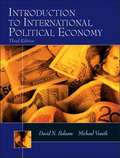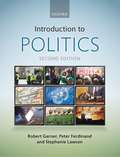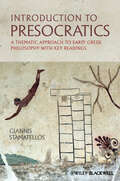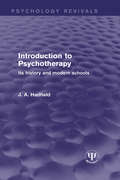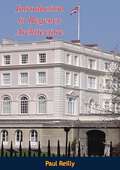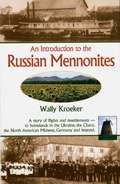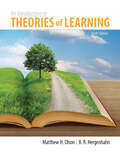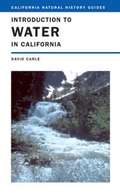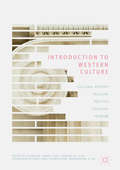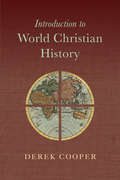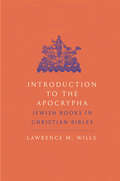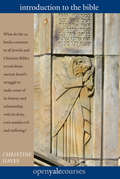- Table View
- List View
Introduction to Igbo Mythology for Kids: A Fun Collection of Heroes, Creatures, Gods, and Goddesses in West African Tradition
by Chinelo AnyadiegwuImmerse yourself in the vibrant world of Igbo heroes, deities, creatures, folktales, and myths, including Chineke the creator, Ana, Igwe, Anyanwu, Ekwensu, and more, plus the story of the first mermaid, the legend of Udenolu the shapeshifting crow, and the story of the tortoise and the Lion King.The first definitive collection of Igbo legends and traditions for kids, this book explores the mythological origins of the Igbo people, the ancient Nri Kingdom, and Igbo cosmology before delving into the Alusi, or the core Igbo deities. Following this introduction to the pantheon of gods and goddesses, a collection of the most popular Igbo myths, folktales, and legends will immerse kids in exciting stories of tricksters, shapeshifters, and heroes, including: The Wrestler Whose Back Never Touched the Ground Ojiugo, the Rare Gem The Tortoise and the Birds, or The Origin Story of Sea Turtles Ngwele Aghuli, Why the Crocodile Lives Alone How Death Came to Be And more! The perfect book for kids who are fascinated by Greek mythology or love the Rick Riordan series, Introduction to Igbo Mythology for Kids offers a fun look into the stories, history, and figures that characterize Igbo culture.
Introduction to Indian Architecture
by Bindia Thapar Surat Kumar Manto Suparna BhallaTake a journey through Indian architecture from the dawn of civilization to the present with this colorful, attractive survey.The architecture of India reflects both the cultural diversity of the subcontinent and its rich political and historical inheritance. In this guide, the various strands of this rich architectural history, from the dawn of civilization to modern times, are beautifully presented in word and picture. Readers are taken on a fascinating tour of Indus Valley civilization, early Vedic traditions, Hindu, Jain, Mughal, regional, colonial and post-independence architectural styles. Themes such as water architecture and the architecture of science also figure prominently, giving many westerners their first glimpse of these styles.The informative text, complemented by 400 photographs, watercolors, maps and plans, provide compelling evidence of India's influence on building design throughout history.
Introduction to Japanese Architecture
by David Young Michiko Young Tan Hong YewIntroduction to Japanese Architecture provides an overview of Japanese architecture in its historical and cultural context. It begins with a discussion of prehistoric dwellings and concludes with a description of contemporary trends in areas as diverse as country inns, underground malls, and love hotels. The intervening 12,000 years are analyzed in reference to major changes in architecture caused by Buddhist and indigenous influences, feudalism, and finally the influence of Western culture in the 19th century.
Introduction to Japanese Culture
by Daniel SosnoskiThe richness of Japan's history is renowned worldwide. The heritage of culture that its society has produced and passed on to future generations is one of Japan's greatest accomplishments. In Introduction to Japanese Culture, you'll read an overview, through sixty-eight original and informative essays, of Japan's most notable cultural achievements, including:Religion, Zen Buddhism, arranged marriages and BushidoDrama and Art--from pottery, painting and calligraphy to haiku, kabuki and karateCuisine--everything from rice to raw fishHome and Recreation, from board games such as Go to origami, kimonos and Japanese gardensThe Japan of today is a fully modern, Westernized society in nearly every regard. Even so, the elements of an earlier age are clearly visible in the country's arts, festivals, and customs. This book focuses on the essential constants that remain in present-day Japan and their counterparts in Western culture.Edited by Daniel Sosnoski, these well-researched articles, color photographs, and line illustrations provide a compact guide to aspects of Japan that often puzzle the outside observer. Introduction to Japanese Culture is wonderfully informative, a needed primer on the cultural make-up and behaviors of the Japanese.
Introduction to Japanese Culture
by Daniel SosnoskiFeaturing full-color photographs and illustrations throughout this text is a comprehensive guide to Japanese culture.The richness of Japan's history is renowned worldwide. The heritage of culture that its society has produced and passed on to future generations is one of Japan's greatest accomplishments. In Introduction to Japanese Culture, you'll read an overview, through sixty-eight original and informative essays, of Japan's most notable cultural achievements, including:Religion, Zen Buddhism, arranged marriages and BushidoDrama and Art-from pottery, painting and calligraphy to haiku, kabuki and karateCuisine-everything from rice to raw fishHome and Recreation, from board games such as Go to origami, kimonos and Japanese gardensThe Japan of today is a fully modern, Westernized society in nearly every regard. Even so, the elements of an earlier age are clearly visible in the country's arts, festivals, and customs. This book focuses on the essential constants that remain in present-day Japan and their counterparts in Western culture.Edited by Daniel Sosnoski, these well-researched articles, color photographs, and line illustrations provide a compact guide to aspects of Japan that often puzzle the outside observer. Introduction to Japanese Culture is wonderfully informative, a needed primer on the cultural make-up and behaviors of the Japanese.
Introduction to Keynesian Dynamics (Routledge Revivals)
by Kenneth K. KuriharaFirst published in 1956, Introduction to Keynesian Dynamics provides a coherent and compact study of macro-dynamic analysis in general and particularly the two outstanding ‘post Keynesian’ developments in the field- 1) dynamic theories of cyclical fluctuations and 2) secular growth analysis.Part I of this book provides a general base of reference for substantive analysis. Part II contains fairly definitive materials, dealing as it does with the modus operandi of cyclical fluctuations, the dynamics of inflation and deflation, the stability conditions of equilibrium, a nonlinear model of dynamic switches, the interaction of endogenous and exogenous variables, and international oscillatory processes. Part III explores the technical possibility and difficulty of securing maximum economic growth with minimum instability. The concluding chapter critically examines the twin problems of steady growth for advanced economies and rapid development for underdeveloped economies in a way that would suggest a common solution. This is a must read for students of economics and economic history.
Introduction to Media and Politics
by Sarah Oates'...a lively introduction to media and politics, with timely chapters on the media, war and terrorism and the internet. If you want to know why media matters in politics this is a great place to start' - Dr Margaret Scammell, London School of Economics and Political Science 'This book has the truly international perspective that helps to put politics and media in the context of current world events...a unique and valuable text' - Professor Lynda Lee Kaid, University of Florida '...a new and promising perspective to the study of media and politics in a comparative dimension' - Professor Paolo Mancini, Università di Perugia Introduction to Media and Politics draws together evidence from the United States, the United Kingdom, Russia and beyond to provide students with an understanding of the relationship between the media and the political sphere. This highly accessible text: - balances theory with case studies on elections, war, terrorism, and the emerging role of the Internet, enabling the reader to think critically about how the media should work in the service of democracy. - places the study of media and politics in a comparative perspective, allowing the reader to consider how the same media institutions - including commercial and public service broadcasting, paid political advertising, and war coverage - function in different countries. This text is essential reading for advanced undergraduate and postgraduate students of media and politics.
Introduction to Medieval Europe 300–1500
by Wim Blockmans Peter HoppenbrouwersIntroduction to Medieval Europe 300-1500 provides a comprehensive survey of this complex and varied formative period of European history. Covering themes as diverse as barbarian migrations, the impact of Christianization, the formation of nations and states, the emergence of an expansionist commercial economy, the growth of cities, the Crusades, the effects of plague, and the intellectual and cultural life of the Middle Ages, the book explores the driving forces behind the formation of medieval society and the directions in which it developed and changed. In doing this, the authors cover a wide geographic expanse, including Western interactions with the Byzantine Empire and the Islamic World. ? Now in full colour, this second edition contains a wealth of new features that help to bring this fascinating era to life, including: A detailed timeline of the period, putting key events into context Primary source case boxes Full colour illustrations throughout New improved maps A glossary of terms Annotated suggestions for further reading The book is supported by a free companion website with resources including, for instructors, assignable discussion questions and all of the images and maps in the book available to download, and for students, a comparative interactive timeline of the period and links to useful websites. The website can be found at www.routledge.com/cw/blockmans.? Clear and stimulating, the second edition of Introduction to Medieval Europe is the ideal companion to studying Europe in the Middle Ages at undergraduate level.
Introduction to Medieval Europe 300–1500
by Wim Blockmans Peter HoppenbrouwersIntroduction to Medieval Europe 300–1500 provides a comprehensive survey of this complex and varied formative period of European history, covering themes as diverse as barbarian migrations, the impact of Christianisation, the formation of nations and states, the emergence of an expansionist commercial economy, the growth of cities, the Crusades, the effects of plague, and the intellectual and cultural life of the Middle Ages. The book explores the driving forces behind the formation of medieval society and the directions in which it developed and changed. In doing this, the authors cover a wide geographic expanse, including Western interactions with the Byzantine Empire and the Islamic World. This third edition contains a wealth of new features that help to bring this fascinating era to life, including: In the book: A number of new maps and images to further understanding of the period Clear signposting and extended discussions of key topics such as feudalism and gender Expanded geographic coverage into Eastern Europe and the Middle East On the companion website: An updated, comparative and interactive timeline, highlighting surprising synchronicities in medieval history, and annotated links to useful websites A list of movies, television series and novels related to the Middle Ages, accompanied by introductions and commentaries Assignable discussion questions and the maps, plates, figures and tables from the book available to download and use in the classroom Clear and stimulating, the third edition of Introduction to Medieval Europe is the ideal companion to studying Europe in the Middle Ages at undergraduate level.
Introduction to Medieval Europe 300–1500: Third Edition
by Wim Blockmans Peter HoppenbrouwersIntroduction to Medieval Europe 300–1500 provides a comprehensive survey of this complex and varied formative period of European history within a global context, covering themes as diverse as barbarian migrations, the impact of Christianisation, the formation of nations and states, the emergence of an expansionist commercial economy, the growth of cities, the Crusades, the effects of plague and the intellectual and cultural dynamism of the Middle Ages. The book explores the driving forces behind the formation of medieval society and the directions in which it developed and changed. In doing this, the authors cover a wide geographic expanse, including Western interactions with the Byzantine Empire, the Islamic World, North Africa and Asia. This fourth edition has been fully updated to reflect moves toward teaching the Middle Ages in a global context and contains a wealth of new features and topics that help to bring this fascinating era to life, including: • West Europe’s catching up through intensive exchange with the Mediterranean Islamic world • growth of autonomous cities and civic liberties • emergence of an empirical and rational worldview • climate change and intercontinental pandemics • European exchange with Africa and Asia • chapter introductions to support students’ understanding of the topics • a fully updated glossary to give modern students the confidence and language to discuss medieval history Clear and stimulating, the fourth edition of Introduction to Medieval Europe is the ideal companion to studying the entirety of medieval history at undergraduate level.
Introduction to Norse Mythology for Kids: A Fun Collection of the Greatest Heroes, Monsters, and Gods in Norse and Viking Myth (Norse Myths)
by Peter AperloImmerse yourself in the dangerous, fascinating, and awesome world of Norse heroes, monsters, gods, and goddesses, from Thor and Loki to Odin, Frey, and many more!Get to know the stories behind your favorite Norse heroes, gods, and villains with this in-depth introduction to Norse mythology. Learn all about how Thor got his hammer Mjölnir, or the cunning and mischievous adventures of the trickster Loki. Discover fantastical creatures, fearsome monsters, and epic battles—all from ancient Scandinavia—with stories including: Thor and the Clay Giant The Death of Baldr Loki&’s Dangerous Children And more! Plus, in addition to the mythical tales, you&’ll also learn what daily life was like for Vikings and how they fought. This book is more than just a collection of gods and goddesses, it&’s the perfect collection of Nordic and Viking trivia for any kid who loves to learn about history or for fans of Marvel movies!
Introduction to Old Order and Conservative Mennonite Groups: People's Place Book No. 12 (People's Place Bks.)
by Stephen ScottThis book tells a story which until now has not been available in such an interesting and comprehensive form. What holds these people together? Why are they growing in number? Where do they live? The Old Order Mennonites are less well known than the Amish, but are similar in many beliefs and practices. Some Old Order Mennonites drive horses and buggies. Others use cars for transportation. Conservative Mennonite groups vary a great deal, but in general espouse strong faith and family life and believe that how they live should distinguish them from the larger society around them. The author details courtship and wedding practices, methods of worship, dress, transportation, and vocation. Never before has there been such an inside account of these people and their lives. The author spent years conferring and interviewing members of the various groups, trying to portray their history and their story in a fair and accurate manner. An enjoyable, educational, inspiring book.
Introduction to Political Economy
by David N. Balaam Michael VesethHistory and overview of political economy
Introduction to Politics (Second Edition)
by Robert Garner Peter Ferdinand Stephanie LawsonIntroduction to Politics, Second Edition, provides an intellectually stimulating yet accessible introduction to politics that takes current global realities into account. The text is divided into three sections that reflect the authors' expertise: concepts and ideologies, comparative politics, and international relations.
Introduction to Presocratics: A Thematic Approach to Early Greek Philosophy with Key Readings
by Giannis StamatellosIntroduction to Presocratics presents a succinct introduction to Greek thinkers of the 6th and 5th century BCE and a thematic exploration of the topics and enquiries opened by these first philosophers and scientists of the Western tradition. Offers a concise, thematically organized introduction to the Presocratics Includes a previously unpublished translation of the main fragments of the Presocratics by Classics scholar Rosemary Wright Covers key figures including Thales, Anaximander and Anaximenes of Miletus, Xenophanes, Heraclitus, Pythagoras, Parmenides and Zeno of Elea, Empedocles, Anaxagoras and Democritus Supplemented with helpful features including a timeline, map of the ancient world, glossary of terms, and index of proper names
Introduction to Psychotherapy: Its History and Modern Schools (Psychology Revivals)
by J. A. HadfieldFirst published in 1967, the original blurb reads: This book is intended to give the intelligent lay reader a comprehensive view of the subject of psychotherapy, the treatment of nervous disorders by mental means. These disorders are of increasing importance on account of their wide-spread nature and of the misery they produce. It describes the development of psychotherapy as employed by the most primitive peoples and races, through animal magnetism and hypnotism to the more modern analytical schools of Freud, Jung and Adler. It sets out in particular to give the positive contributions of these various systems, although this does not preclude criticism of their weaknesses and more dubious theories. Dr Hadfield has had the widest experience, having treated psychoneurotic disorders for over fifty years, including the war neuroses in the two world wars, both in the Navy and in the Army; and, as Lecturer in the University of London in the subject for over forty years, he has had the opportunity to systematize the knowledge thus obtained. As a result of this experience he has come to conclusions as to the nature, causes and treatment of such disorders differing somewhat from those of the established Schools, and it is these findings which are given in the latter part of the book under the title, ‘Direct Reductive Analysis’. The book will be useful to all those – teachers and parsons as well as medicals – who have to deal with human beings and their aberrations, and to them it is addressed.
Introduction to Regency Architecture
by Paul ReillyWith this book, author Paul Reilly had two ends in view. The first is to introduce the ever fewer examples of Regency buildings while they still exist. The second is to explain the historical role of Regency architecture, to show in what way it was a true descendant of the 18th century and in what way it broke new ground.
Introduction to Russian Mennonites: A Story Of Flights And Resettlements-- To Homelands In The Ukraine, The Chaco, T
by Wally KroekerMennonites in Russia? Invited by Catherine the Great to farm the Russian steppes -- in exchange for exemption from military service -- Mennonite emigrants from Polish Prussia and The Netherlands made their home in Russia. Some remain today; many more eventually left for North and South Americas and Europe. Nearly all retain memories and stories from that place -- unbelievable prosperity for some; unspeakable terror for many; church tensions; struggles between the landed and the landless; exquisite clockmaking, storytelling, musicmaking, and food. Himself a Russian Mennonite, Kroeker heads into the history, but also the later movement of these people to the U.S. and Canada. Are they at all distinctive today? What has drawn some to the cities and professions, and others to the rural prairies? What about those in Europe, and those still in the former Soviet Union? Kroeker tells it all with vibrancy -- the overview and the memorable details. Includes dozens of historic and contemporary photographs.Skyhorse Publishing, as well as our Arcade imprint, are proud to publish a broad range of books for readers interested in history--books about World War II, the Third Reich, Hitler and his henchmen, the JFK assassination, conspiracies, the American Civil War, the American Revolution, gladiators, Vikings, ancient Rome, medieval times, the old West, and much more. While not every title we publish becomes a New York Times bestseller or a national bestseller, we are committed to books on subjects that are sometimes overlooked and to authors whose work might not otherwise find a home.
Introduction to St. Thomas Aquinas
by Anton C. Pegis St. Thomas AquinasThe comparatively short life of St. Thomas Aquinas covers the second and third quarters of the thirteenth century. At the beginning of his life, Greek and Arabian philosophy was just entering the Latin world; three years after his death, the large-scale condemnation of Aristotelianism in Paris by Bishop Stephen Tempier signalized what turned out to be a defeat for Christian thinkers in the presence of Greek and Arabian philosophers, Platonists and Aristotelians
Introduction to Theories of Learning: Ninth Edition
by Matthew H. OlsonDefines learning and shows how the learning process is studied. Clearly written and user-friendly, Introduction to the Theories of Learning places learning in its historical perspective and provides appreciation for the figures and theories that have shaped 100 years of learning theory research. The 9th edition has been updated with the most current research in the field. With Pearson's MySearchLab with interactive eText and Experiment's Tool, this program is more user-friendly than ever. Learning Goals Upon completing this book, readers should be able to: Define learning and show how the learning process is studied Place learning theory in historical perspective Present essential features of the major theories of learning with implications for educational practice Note: MySearchLab does not come automatically packaged with this text. To purchase MySearchLab, please visit: www.mysearchlab.com or you can purchase a ValuePack of the text + MySearchLab (at no additional cost).
Introduction to Water in California
by David CarleThis book is a natural history guide, but one that recognizes the overwhelming role of humanity in the story of California water. The focus here is on a contemporary understanding of the natural waterscape and watersheds of the state and of the extended watersheds that people created by redirecting water across the West. The goal is to help Californians better appreciate the water that emerges from their taps, what it takes to move it there, and what changes occur in environments along the way.
Introduction to Western Culture: Cultural History, Religion, Politics, Folklore And Tourism
by Guobin Xu Yanhui Chen Lianhua XuPromoting cultural understanding in a globalized world, this collection provides a concise and unique introduction to Western culture, through the voices of Chinese scholars. Written by a team of experts in their fields, the book provides insights into Western history and culture, covering an interdisciplinary range of topics across literature, language, music, art and religion. It addresses such issues as tourism and etiquette, as well as the key differences of distinct cultures, providing readers with a succinct yet effective way to master a basic understanding of Western culture.
Introduction to World Christian History
by Derek CooperChristianity is a global faith. Today, people are increasingly aware that Christianity extends far beyond Europe and North America, permeating the Eastern and Southern hemispheres. What we may know less well is that Christianity has always been a global faith. A vast untold story waits to be heard beyond the familiar tale of how the Christian faith spread across Europe. Not only was Jesus born in Asia, but in the early years of the church Christianity found fertile soil in Africa and soon extended to East Asia as well. In this brief introduction to world Christian history, Derek Cooper explores the development of Christianity across time and the continents. Guiding readers to places like Iraq, Ethiopia and India, Scandanavia, Brazil and Oceania, he reveals the fascinating—and often surprising—history of the church.
Introduction to the Apocrypha: Jewish Books in Christian Bibles
by Lawrence M. WillsAn ambitious introduction to the Apocrypha that encourages readers to reimagine what &“canon&” really means Challenging the way Christian and non-Christian readers think about the Apocrypha, this is an ambitious introduction to the deuterocanonical texts of the Christian Old Testaments. Lawrence Wills introduces these texts in their original Jewish environment while addressing the very different roles they had in various Christian canons. Though often relegated to a lesser role, a sort of &“Bible-Lite,&” these texts deserve renewed attention, and this book shows how they hold more interest for both ancient and contemporary communities than previously thought.
Introduction to the Bible
by Christine HayesThis book examines the small library of 24 books common to all Jewish and Christian Bibles—books that preserve the efforts of diverse writers over a span of many centuries to make sense of their personal experiences and those of their people, the ancient Israelites. Professor Christine Hayes guides her readers through the complexities of this polyphonous literature that has served as a foundational pillar of Western civilization, underscoring the variety and even disparities among the voices that speak in the biblical texts. Biblical authors wrote in many contexts and responded to a sweeping range of crises and questions concerning issues that were political, economic, historical, cultural, philosophical, religious, and moral. In probing chapters devoted to each of the 24 books of the Hebrew Bible, or Old Testament, Hayes reconstructs the meanings and messages of each book and encourages a deeper appreciation of the historical and cultural settings of ancient biblical literature.
